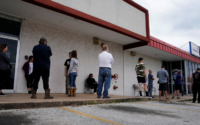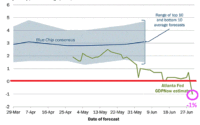Another housing bubble? ‘We’re skating close to one,’ says Realtor.com economist
This might be the hottest housing market ever recorded. Over the past 12 months, U.S. home prices are up a staggering 19.2%. For comparison, in the years leading into the 2008 housing bust, the biggest 12-month jump was 14.5%.
Heading into 2022, real estate research firms forecasted that the ongoing housing boom would lose some steam and home price growth would decelerate. It hasn’t come to fruition—yet. Actually, if anything, this year it has gotten a bit hotter, with housing inventory on Zillow down 52% from pre-pandemic levels.
That stubbornly hot housing market now has housing economists flirting with the real estate industry’s most feared word: bubble.
“We’re not in a housing bubble just yet—but we’re skating close to one if prices continue rising at the current pace,” said George Ratiu, a housing economist at Realtor.com, in an article published last week on the home listing site.

It isn’t just Ratiu. There’s a growing chorus of economists speculating that if home price growth doesn’t abate soon, the housing market could eventually overheat. Or worse: We could wind up in another full-fledged housing bubble.
Back in March, researchers at the Federal Reserve Bank of Dallas sent a shockwave through the industry after releasing a paper titled Real-Time Market Monitoring Finds Signs of Brewing U.S. Housing Bubble. The Dallas Fed researchers were blunt in their assessment: “U.S. house prices are again becoming unhinged from fundamentals.”
But even if we’re in a housing bubble, the Dallas Fed researchers don’t think it would be a 2008 repeat. For starters, homeowners are in much better shape now than they were heading into the 2008 meltdown. At the height of the 2000s housing bubble, U.S. households were spending 7.2% of disposable personal income on mortgage debt payments. As of the fourth quarter of 2021, that figure is just 3.8%. In addition, subprime mortgages are less of a worry these days, given the 2010 Dodd-Frank Act outlawed many of the shady loans that plagued the aughts.
“There is no expectation that fallout from a housing correction would be comparable to the 2007–09 global financial crisis in terms of magnitude or macroeconomic gravity. Among other things, household balance sheets appear in better shape, and excessive borrowing doesn’t appear to be fueling the housing market boom,” write the Dallas Fed researchers.

Historically speaking, U.S. homeowners are in a fairly strong financial position. But they aren’t who economists are worried about. Instead, they’re concerned about the next crop of homebuyers.
Back in December, the typical American household would have to spend 24% of its monthly income to make a mortgage payment on the average-priced U.S. home, according to Black Knight, a mortgage technology and data provider. At the latest reading this month, Black Knight’s mortgage-payment-to-income ratio was now up to 31%—the highest reading since September 2007. (During the 2010s decade, that figure averaged 19.9%.)
What’s going on? The swift move up in mortgage rates over the past few months has dramatically increased mortgage payments for new borrowers. Back in December, the average 30-year fixed mortgage rate stood at 3.11%. At that rate, a borrower would owe a $2,138 monthly principal and interest payment on a $500,000 mortgage. A borrower who took out that same mortgage at the current average rate (5.11%) would owe $2,718 per month. Over the course of the 30-year loan, that’s an additional $208,800 in payments.
Soaring mortgage rates could be a good thing. At least that’s the message from Logan Mohtashami, lead analyst at HousingWire. He sees a housing market that needs to lose some steam. The spike in mortgage rates, he says, could result in home shoppers backing off a bit. There are some signs it is already starting to happen. If the housing market does slow, he says, it could allow inventory levels to rise and ultimately see us move into a market with lower levels of home price appreciation.

Every single major real estate research firm with a publicly available forecast model projects that home prices will continue to climb over the coming year. Over the coming 12 months, Zillow predicts home prices are poised to spike 14.9%. CoreLogic forecasts a more modest 5% jump, while the Mortgage Bankers Association predicts prices will climb 4.8%.
Industry insiders do say there’s a chance the economic shock caused by soaring mortgage rates could see home prices drop in some regional housing markets.
“Some markets will see a correction if mortgage rates continue to rise, in which sales will drop and prices will follow,” Realtor.com’s Ratiu said in the home listing site’s article, published on April 19. Where might prices drop? Ratiu points to Rust Belt markets like Toledo and Rochester, N.Y.
While housing economists who have spoken to Fortune aren’t predicting a housing correction or crash, they do see a market that’s starting to reach concerning levels. Earlier this month, CoreLogic provided Fortune with its regional market risk assessment scores for around 400 metropolitan statistical areas. The real estate research firm aimed to find out whether local income levels could support regional home prices.
The finding? CoreLogic now considers 65% of U.S. regional housing markets to be “overvalued.” That “overvalued” label was placed on every metropolitan statistical area in Arizona, Florida, Texas, and Nevada.
If you’re hungry for more housing data, follow me on Twitter at @NewsLambert.
This story was originally featured on Fortune.com
[ad_2]
Source link

